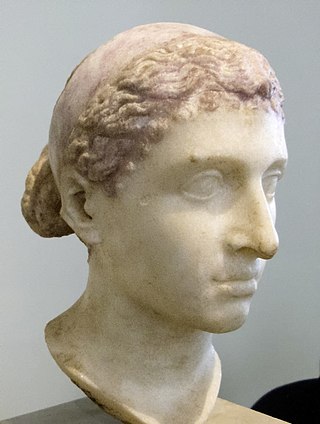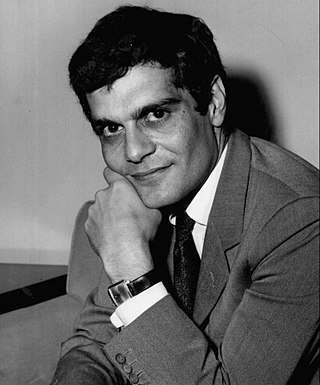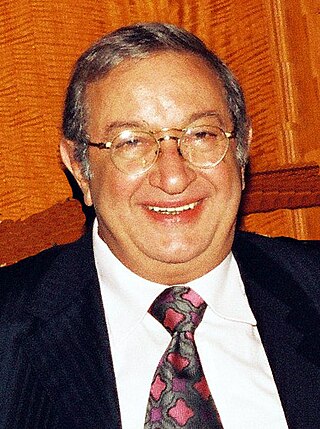
Soad Muhammad Kamal Hosny was an Egyptian actress born in Cairo. She was known as the "Cinderella of Egyptian cinema" and one of the most influential actresses in the Middle East and the Arab world. She rose to stardom at the end of the 1950s, performing in more than 83 films between 1959 and 1991 with nine films in the greatest 100 films in the history of Egyptian cinema. A majority of her films were shot in the 1960s and 1970s. Her final screen appearance was in the 1991 film,The Shepherd and the Women, directed by her ex-husband Ali Badrakhan.

Cleopatra VII Thea Philopator was Queen of the Ptolemaic Kingdom of Egypt from 51 to 30 BC, and its last active ruler. A member of the Ptolemaic dynasty, she was a descendant of its founder Ptolemy I Soter, a Macedonian Greek general and companion of Alexander the Great. After the death of Cleopatra, Egypt became a province of the Roman Empire, marking the end of the last Hellenistic-period state in the Mediterranean and of the age that had lasted since the reign of Alexander. Her first language was Koine Greek, and she was the only known Ptolemaic ruler to learn the Egyptian language.

Omar Sharif was an Egyptian actor, generally regarded as one of his country's greatest male film stars. He began his career in his native country in the 1950s. He is best known for his appearances in American, British, French, and Italian productions. His career encompassed over 100 films spanning 50 years, and brought him many accolades including three Golden Globe Awards and a César Award for Best Actor.

The ankh or key of life is an ancient Egyptian hieroglyphic symbol used to represent the word for "life" and, by extension, as a symbol of life itself.

The Prince of Egypt is a 1998 American animated musical drama film produced by DreamWorks Animation and released by DreamWorks Pictures. The second feature film from DreamWorks and the first to be traditionally animated, it is an adaptation of the Book of Exodus and follows the life of Moses from being a prince of Egypt to a prophet chosen by God to carry out his ultimate destiny of leading the Hebrews out of Egypt. The film was directed by Brenda Chapman, Steve Hickner, and Simon Wells, and produced by Jeffrey Katzenberg, Penney Finkelman Cox, and Sandra Rabins, from a screenplay written by Philip LaZebnik. It features songs written by Stephen Schwartz and a score composed by Hans Zimmer. The film stars the voices of Val Kilmer, Ralph Fiennes, Michelle Pfeiffer, Sandra Bullock, Jeff Goldblum, Danny Glover, Patrick Stewart, Helen Mirren, Steve Martin, and Martin Short.

Nour El-Sherif, born Mohamad Geber Mohamad Abd Allah was a prominent Egyptian actor. He has 6 films in the Top 100 Egyptian films list.

Samia Gamal was an Egyptian belly dancer and film actress.

Hassan el-Imam was a prominent Egyptian film director. He was nicknamed the Box-office King.
Middle Eastern cinema collectively refers to the film industries of West Asia and part of North Africa. By definition, it encompasses the film industries of Egypt, Iran, Bahrain, Iraq, Israel, Jordan, Kuwait, Lebanon, Palestine, Oman, Qatar, Saudi Arabia, Syria, United Arab Emirates, and Yemen. As such, the film industries of these countries are also part of the cinema of Asia, or in the case of Egypt, Africa.
The following is a list of Egyptian films. The year order is split by decade. For an alphabetical list of films currently on Wikipedia, see Category:Egyptian films.

The cinema of Egypt refers to the flourishing film industry based in Cairo, sometimes also referred to as Hollywood of the East or Hollywood on the Nile. Since 1976, the capital has held the annual Cairo International Film Festival, which has been accredited by the FIAPF. There are an additional 12 festivals. Of the more than 4,000 short and feature-length films made in MENA region since 1908, more than three-quarters were Egyptian films. Egyptian films are typically spoken in the Egyptian Arabic dialect.

Mahmoud el-Meligy was an Egyptian screenwriter and an actor of film, theater, and television. He started his career playing minor roles but achieved stardom in the late 1930s. A popular and award-winning actor, he has acted in hundreds of films and was famous for his evil, villain roles.

The Night of Counting the Years, also released in Egypt as The Mummy (Elmomya) (المومياء), is a 1969 Egyptian film and the only feature film directed by Shadi Abdel Salam. It features Nadia Lutfi in special appearance. It is the 3rd on the list of Top 100 Egyptian films. The film was produced by Roberto Rossellini for General Egyptian Cinema Organisation. Rossellini was instrumental in encouraging Abdel Salam to make the film, The Night of the Changing Years tells a story set among the grave robbers of Kurna in Upper Egypt.

Salah El-Din Ahmed Mourad Zulfikar was an Egyptian actor and film producer. He started his career as a police officer in the Egyptian National Police, before becoming an actor in 1956. He is regarded as one of the most influential actors in the history of the Egyptian film industry. Zulfikar had roles in more than a hundred feature films in multiple genres during a 37-year career, mostly as the leading actor. He was one of the most dominant leading men in Egyptian cinema.
Fatin Abdel Wahab was an Egyptian film director. He directed 52 films between 1949 and 1970. His 1961 film Wife Number 13 was entered into the 12th Berlin International Film Festival. His 1965 film Driven from Paradise was entered into the 4th Moscow International Film Festival.
Those People of the Nile is a 1972 drama film directed by Youssef Chahine. It stars Soad Hosny and Salah Zulfikar. The film is co-produced by companies in Egypt and Russia.













